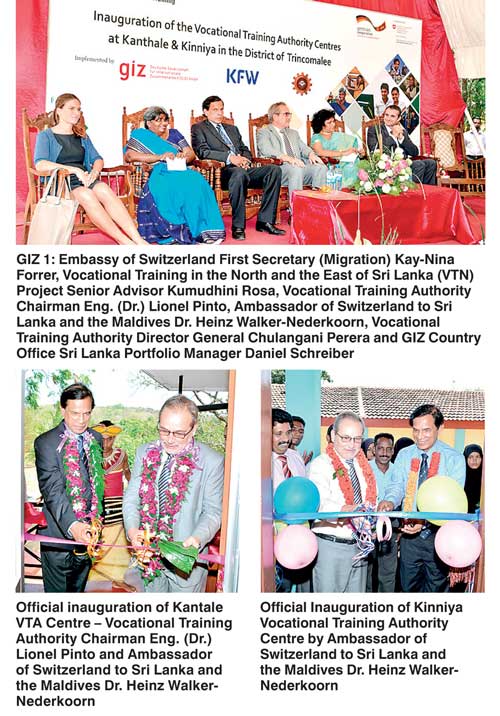Tuesday Feb 24, 2026
Tuesday Feb 24, 2026
Friday, 17 July 2015 00:00 - - {{hitsCtrl.values.hits}}
The Vocational Training Authority (VTA) announced the inauguration of two vocational training institutes in Trincomalee on 8 July.
The ‘Vocational Training in the North and East of Sri Lanka’ (VTN) project is a bilateral cooperation between the Democratic Socialist Republic of Sri Lanka and the Federal Republic of Germany. 
The project is implemented by Deutsche Gesellschaft für Internationale Zusammenarbeit (GIZ) GmbH and the Kreditanstalt für Wiederaufbau (German Development Bank - KfW) on behalf of the German Federal Ministry for Economic Cooperation and Development (BMZ).
The project is co-funded by the State Secretariat for Migration of the Government of Switzerland. The Sri Lankan Governmental partner is the Ministry of Skills Development and Vocational Training.
The two institutes are amongst 11 planned satellite centres that will support the Sri Lankan-German Training Institute (SLGTI), the project’s flagship training centre, currently under construction in Kilinochchi. The Trincomalee centres, located in Kinniya and Kantale which come under the Vocational Training Authority (VTA) have been renovated and equipped as a result of ‘Bridges to the Future’, a tripartite collaboration with the Swiss Government to strengthen the VTN project.
The additional Swiss financing adds value to the current project initiatives and widens the reach of the VTN project in the North and East.
The inauguration, held at the District Vocational Training Center in Kanthale, was graced by Heinz Walker-Nederkoorn, Ambassador of Switzerland to Sri Lanka and the Maldives, Eng. (Dr.) Lionel Pinto, Chairman of the Vocational Training Authority (VTA), and Kumudhini Rosa, Senior Advisor of GIZ VTN Project.
The GIZ VTN project is designed to improve demand-oriented vocational education and training in the north and east of Sri Lanka. The curriculum covers electrical, ICT, beauty culture, bakery, aluminium fabrication, welding and tailoring courses with a focus on English for up to 160 students in both centres. In addition to technical skills, social integration and the development of social skills will be integral aspects of the training process.
The centres are state of the art, serving to equip the youth from the north and east with the skills they need to compete in the labour market. Marginalised groups such as war widows and persons with disabilities will have access to the training. Multi-lingual public awareness campaigns have been carried out to communicate the benefits of the Vocational Training Center and raise awareness for its uses. The centres are expected to benefit students from various ethnic groups as is representative of Trincomalee’s multi-cultural population.
Germany has been developing the vocational training sector in Sri Lanka for over 50 years of collaboration in supporting vocational training programs in the island.